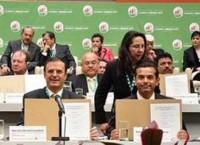Cities sign on to climate action
 Cities have sent a
Cities have sent astrong message to national governments ahead of the upcoming round
of climate talks, scheduled to begin in Cancún, Mexico, at the end
of this month. The message is: we are acting to address our
planet’s changing climate and we want you to do the same.
On Nov. 21, 135 mayors from around the world signed an agreement
to address climate change at the World Mayors Summit on Climate in
Mexico City. The Mexico City Pact establishes a global climate
monitoring and verification mechanism for cities.
It calls for cities to develop and implement climate action
plans and introduce local laws and initiatives designed to reduce
GHG reductions. To establish and follow up on their commitments,
the pact’s signers will establish their climate actions and
progress with the Carbon Cities Climate Registry (CCCR) at the Bonn
Centre for Local Climate Action and Reporting (carbonn).
The pact was signed by a diverse set of cities around the world,
both large and small, from megacities such as Los Angeles, Jakarta,
Sao Paolo, Johannesburg, Istanbul and Mexico City, to cities such
as Paris, Vancouver and Barcelona - already leaders in developing
innovative climate solutions - to small cities such as Burnsville,
Minnesota, and Malmo, Sweden, to name just a few.
With the establishment of the Registry, other cities of the
world can sign on and be part of the pact. And of course, because
the information will be freely available, citizens everywhere can
know what their city is doing in comparison to other
jurisdictions.
The Mexico City Pact will be presented to the United Nations
Framework Convention for Climate Change (UNFCCC) when it begins
meeting later this month in Mexico. We will send it with a strong
message that we want national governments to agree on a global
binding treaty.
Cities have great capacities to address
climate change, even in the absence of a binding global treaty
among nations.
In addition, because funding is a critical component to ensure
that cities around the world have the financial resources to
implement climate programs, we will urge national governments that
as part of any treaty to set aside a significant portion of funds
to be passed-through to cities and local governments to implement
local climate programs.
Cities have great capacities to address climate change, even in
the absence of a binding global treaty among nations. We manage
public buildings and lands. We operate water and electric utilities
and solid waste facilities. We establish building codes and zoning
regulations. We run public transportation systems. If we can make
all of these services more energy efficient or cleaner, we can have
a significant impact on reducing harmful emissions.
With more than half the world’s population today living in
cities for the first time in human history, mayors and urban
leaders are on the frontline of the planet’s fight against a
changing climate. At the World Mayors Summit on Climate, we took
action. Now we want national governments to summon the political
will to do the same.
Marcelo Ebrard is mayor of Mexico City and chair of the
World Mayors Council on Climate.
Source: www.huffingtonpost.com

